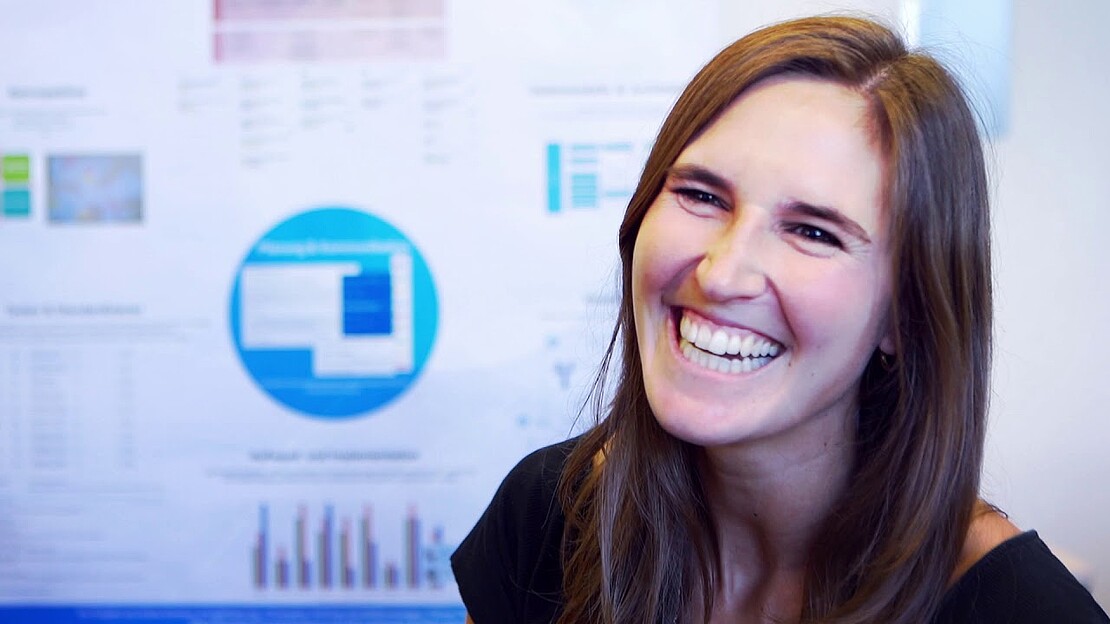Applied Computer Science
IT systems are everywhere, and they’re here to stay – from popular websites for shopping and other pursuits and apps that help people find and purchase all kinds of services to the large-scale systems that power it all and need to work in the background without a hitch, 24/7.
Our Bachelor’s degree course in Applied Computer Science will enable you to experience technologies, methods and challenges around planning, realising, evolving and operating IT systems of all shapes and sizes.
Your future career
................................................................................................................................................................................................
Applied computer science graduates are in short supply on the job market and therefore in great demand. Their job is first and foremost to develop software, which in this era of digitalisation is needed in virtually all sectors of the economy. It’s not only traditionally ‘scientific’ fields of work that are relying increasingly on IT, although that’s a crucial area for specialists in the field, who might work on centralised or distributed information systems, the Internet of things, genome analysis, machine learning or data science, to name but a few examples. Companies have come to value our graduates with their focused, real-world education and experience; we always make sure our teaching is relevant to application and bang up-to-date, and our students leave us able to hit the ground running on projects in industrial settings.
Course content and structure
................................................................................................................................................................................................
The discipline of applied computer science encompasses knowledge, skills and methodologies around the analysis and design of IT systems.
The degree course commences with foundational modules in mathematics, programming, databases, theoretical principles of computer science, structures of computers, and machine-oriented programming.
As the course progresses, students focus on software engineering, distributed systems, IT system architectures, IT security and smart systems. Alongside these foci, they have the opportunity to specialise via a diverse range of required elective modules and associated projects, including in computer graphics, data science, enterprise architecture management, the Internet of things, robot vision, learning agents (robot control), smart systems communication, autonomous driving, and human-computer interaction. Social science modules round off the spectrum of subjects on offer.
You’ll complete this six-semester degree course with your Bachelor thesis.
Your interests and skills
................................................................................................................................................................................................
You’ll need a strong interest in how large-scale software systems and their underlying technologies work, as well as being keen to find out about the collaborative process of designing, developing and testing them via first-hand experience.
Mathematical skills, a logical mindset, an ablity to work well in small groups, and a flair for language will all help you progress well. It’s helpful, but not required, for you to have a good level of proficiency in English and some programming experience.
Admission requirements
................................................................................................................................................................................................
Higher education entrance qualification
You can apply directly for this course if you hold one of the following qualifications:
- Fachhochschulreife
- Allgemeine Hochschulreife
- Fachgebundene Hochschulreife (subject-specific HE entrance qualification)
- Meister*in (vocational qualification – master tradesperson)
- Fachwirt*in (certified specialist)
Applicants who do not hold a higher education entrance qualification but have completed vocational training (Berufsausbildung) and at least three years of subsequent work experience can apply under Section 38 of the Hamburg Higher Education Act, which sets out special provisions for these applicants (Besonderer Hochschulzugang für Berufstätige).
Find out more atAdmission requirements for a Bachelor's degree.
Pre-course experience
We do not require you to have completed pre-course experience for this course.
International applicants
If you completed your schooling outside Germany and want to study here for a Bachelor’s degree, you need to hold an academic school-leaving qualification which entitles you to admission to higher education; that is, it needs to be comparable to a German Abitur or Fachhochschulreife. The organisation uni assist will check your certificates from school and any degree-level studies to establish comparability. Please note that you are also required to have proof of German at level C1 – for example, in the form of a TestDaF certificate – in order to apply for all Bachelor's degree courses (except Information Engineering).
You can find more information about HAW Hamburg’s application criteria at International applicants.
Application process
................................................................................................................................................................................................
We only accept online applications. Before applying, applicants must register with www.hochschulstart.de. During the application period (for the winter semester: 1 June–15 July; for the summer semester: 1 December–15 January) you can find the online application and detailed information about the application process on the Applying for a Bachelor's degree course page.
You can find information about the selection process and the numerus clausus (NC) from the previous semester here: Applying for a Bachelor's degree course/Selection criteria
International applicants are also required to apply during the application period.
To make the process easier for you, we have compiled a step-by-step checklist: International applicants
Questions about selecting a course, applications, admissions and degree courses
................................................................................................................................................................................................
Applications and admissions
Student Admissions and Registration Office (Studierendensekretariat)
Stiftstraße 69, 20099 Hamburg (ground floor)
T +49.40.428 75-9898
studierendensekretariat (at) haw-hamburg (dot) de
Contact us with your questions about applications and admissions
The Information Point is open at the following times:
Monday–Thursday: 10:00 am–1:00 pm
Friday: closed
In-person office hours:
Thursday: 2:00 pm–4:00 pm
Telephone office hours:
Monday and Tuesday: 9:00 am–10:00 am
For general queries about HAW Hamburg degree courses and course choice
Student Counselling Team (Zentrale Studienberatung)
Stiftstraße 69, 1st floor, room 122
20099 Hamburg
T +49 40 42875 9110
Contact form
Office hours
Contact person for applicants with disabilities or chronic health conditions
Meike Butenob/Dieter Röh
Stiftstraße 69, Haus 3, room 37
Tel. +49.40.428 75-7220
inklusion (at) haw-hamburg (dot) de
Contact the department
................................................................................................................................................................................................
Specifically subject-related queries:
Prof. Dr. Thomas Lehmann
Berliner Tor 7, room 07.80, 20099 Hamburg
Tel.: + 49.40.428 75-8335
and
Prof. Dr. Stefan Sarstedt
Berliner Tor 7, room 1085, 20099 Hamburg
Tel.: + 49.40.428 75-8327
studienfachberatung.informatik (at) haw-hamburg (dot) de
Enquiries about the cooperative degree programme:
Coordinator for cooperative degree programmes in engineering and computer science:
Berliner Tor 7, room 1282, 20099 Hamburg
Tel.: + 49.40.428 75-8610
dualstudium_technik(@)haw-hamburg.de

